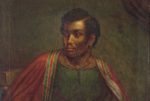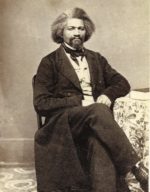On Monday, February 2, 1880, Charles Stewart Parnell addressed the American Congress. He was only the fourth international politician to be accorded this honor and the first Irish man. During his 32-minute-long speech, he laid out a blue-print for the end of the much-hated landlord system in Ireland. He also linked it to recurring famines in Ireland. The success of Parnell’s … [Read more...] about Charles Stewart Parnell: The ‘Forgotten Famine’ and the American Congress
Christine Kinealy
Ira Aldridge: An ‘AFRICAN ROSCIUS’ in Ireland
IA Newsletter October 30, 2021
If you had been in London on 15 May 1835, you could have heard Daniel O’Connell, Ireland’s Liberator, speak at a large Anti-Slavery meeting in the prestigious Exeter Hall. O’Connell, the hero of Catholic Emancipation, had established himself as the leading transatlantic opponent of enslavement and as a thorn in the side of American enslavers. But if you had been almost 300 … [Read more...] about Ira Aldridge: An ‘AFRICAN ROSCIUS’ in Ireland
Ira Aldridge: African Tragedian in Ireland
The National Famine Museum, Strokestown Park, and Irish Heritage Trust have released Ira Aldridge: Black Tragedian in Ireland in collaboration with Professor Christine Kinealy from the African American Irish Diaspora Network and Ireland’s Great Hunger Institute at Quinnipiac University, as part of its Great Famine Voices 2023 season which is funded by the Government of Ireland … [Read more...] about Ira Aldridge: African Tragedian in Ireland
Teaching the Great Hunger in the United States
Professor Maureen Murphy developed the New York State Great Hunger Curriculum and is historian of The Hunger Memorial in New York City. She reflects on teaching the Irish Famine, the Hunger Memorial, and the role of women such as Asenath Nicolson in alleviating hunger and homelessness in the past and present. Please join us for a live online post-show discussion on … [Read more...] about Teaching the Great Hunger in the United States
Following in Frederick Douglass’s Footsteps:
A Walking Tour of Dublin
In August 1845, an American “fugitive slave” named Frederick Douglass arrived in Dublin. He was seeking refuge from capture and a return to enslavement in his home country. Twenty-seven-year-old Douglass referred to his four months in Ireland as the “happiest moments” of his life. He also described it as “transformative”. Ireland changed Frederick Douglass and Frederick … [Read more...] about Following in Frederick Douglass’s Footsteps:
A Walking Tour of Dublin




